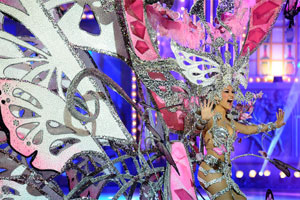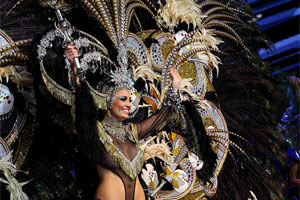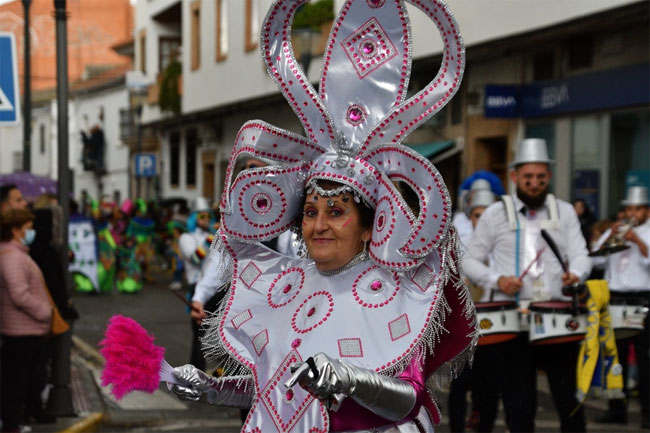Arrival Festival
What is the Arrival Festival about?
The Arrival Festival is a cultural festival celebrated every year in Baiona, a coastal town in the province of Pontevedra, Galicia, Spain. The festival commemorates the arrival of the caravel Pinta, commanded by Martín Alonso Pinzón, in Baiona on March 1st, 1493, after its historic voyage to the New World with Christopher Columbus.
It lasts for several days, usually between three to four days. The exact duration may vary from year to year, but it usually starts at the end of February or the beginning of March and extends throughout the closest weekend to March 1st, the date when the Pinta arrived in Baiona in 1493. It features a series of activities, including:
- Historical parade: The historical parade is the main event of the festival. During the parade, the arrival of the Pinta in Baiona in 1493 is recreated. Participants wear costumes from the era, and there are floats and scenes that recreate the atmosphere of the time.
- Medieval market: In the medieval market, visitors can buy handmade products, typical food, and drinks from the era.
- Cultural activities: During the Arrival Festival, there are also cultural activities such as concerts, exhibitions, theatrical performances, and children's activities.
- Gastronomy: During the festival, you can taste typical dishes from Galician cuisine, such as Galician-style octopus, pork shoulder with turnip greens, or empanadas.
The Arrival Festival is an important event for the local community and attracts many visitors from all over the world every year. It is a unique opportunity to learn about the history and culture of Galicia and enjoy the hospitality and joy of its people.
Origins and History
The arrival of the Pinta in Baiona was a significant moment in Spanish and European history, as it was the first news in Europe of the existence of the New World. The news of this discovery spread rapidly throughout Europe, initiating the era of exploration and colonization of America.
The Fiesta de la Arribada has been celebrated for over a century in Baiona, and is an opportunity for the city's inhabitants and visitors from around the world to learn about the history and culture of Galicia. The festival features historical parades, medieval markets, cultural activities, concerts, and local gastronomy tastings, among other things. The Fiesta de la Arribada is a highly anticipated event for the local community and attracts thousands of visitors every year.
Visitor Tips
- Plan your visit in advance: The Fiesta de la Arribada is a very popular event, so make sure to plan your visit in advance. Book your accommodations and transportation ahead of time to avoid problems.
- Dress appropriately: The Fiesta de la Arribada takes place in March, so make sure to wear comfortable and warm clothing. It is also recommended to bring an umbrella or raincoat, as it may rain.
- Arrive early: The festival attracts a large number of visitors, so arrive early to get a good spot to watch the parade and other events.
- Try the local cuisine: The Fiesta de la Arribada is an excellent opportunity to try Galician cuisine, such as octopus a la gallega, empanadas, and albariño wine.
- Make the most of your time: There are many things to do and see at the Fiesta de la Arribada, so make sure to make the most of your time and enjoy everything the event has to offer.
Crafts and recommended shopping
If you're looking to do some shopping and take souvenirs from your visit to Baiona, there's a wide variety of local crafts and products you can find in the city. Here are some recommendations:
- Ceramics: Ceramics are one of the most popular crafts in the region, and you can find a wide variety of handmade pieces in the shops of Baiona.
- Textiles: You'll also find a wide variety of textile products, such as blankets, towels, and rugs, made with local wool and cotton.
Leather: Local artisans produce a wide variety of leather products, such as shoes, bags, and belts. - Jewelry: Silver jewelry and semiprecious stones are another popular craft in the region, and you can find a wide variety of unique designs in the shops of Baiona.
- Food products: In addition to local cuisine, you can also find local products such as honey, jams, and canned fish and seafood.
- Souvenirs: Souvenir shops offer a wide variety of products, such as t-shirts, mugs, keychains, and postcards with images of Baiona and the Fiesta de la Arribada.
Overall, Baiona is a city with a wide variety of local products and crafts, so you're sure to find something that fits your taste and budget. It's always recommended to compare prices and quality in different stores before making a purchase.
Popular local gastronomy of Baiona
Baiona is a coastal city in Galicia, Spain, and its gastronomy is based on the products from the sea and land of the region. Some of the popular dishes in the area include:
- Pulpo a la gallega: It is one of the most popular dishes in Galicia and consists of octopus cooked in water with salt, paprika, and olive oil. It is served in slices with boiled potatoes.
- Galician empanadas: These are savory pies filled with meat, seafood, or vegetables. They can be found everywhere in Galicia, including Baiona.
- Seafood: Baiona is known for its variety of fresh seafood, such as mussels, oysters, clams, shrimp, and crabs.
- Albariño wine: The Rías Baixas region, where Baiona is located, is known for its production of Albariño wine, a dry and fruity white wine that is perfect for accompanying seafood dishes.
- Tarta de Santiago: A typical dessert from Galicia, made with almonds, sugar, eggs, and lemon zest.
- Queso de Tetilla: It is a soft and creamy cheese made with cow's milk. It is used in many regional dishes and can be enjoyed on its own or with bread.
These are just some of the popular dishes that can be enjoyed in Baiona and throughout the Galicia region. Local gastronomy is an important part of the culture and history of the region, so it is worth trying some of these dishes during a visit to the city.




